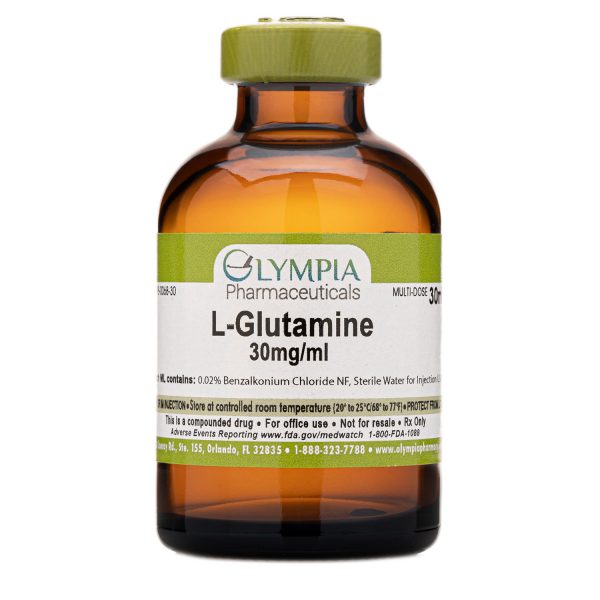
Glutamine is an amino acid. Amino acids play many roles within the body. Their main purpose is to serve as building blocks for proteins. Glutamine is the most abundant free amino acid in the body. It is produced in the muscles and distributed via the bloodstream. Glutamine provides the necessary nitrogen and carbon to fuel a variety of cell processes. It is also essential to the production of some amino acids and glucose. Because of this, glutamine plays a key role in fueling the body’s natural healing processes and healthy organ function. The body can usually synthesize sufficient amounts of glutamine, but in some instances of stress, such as after a traumatic injury or illness, the body’s demand for glutamine increases and can outpace the amount the muscles can produce on their own. Additional glutamine can be obtained from the diet. Glutamine is found in protein-rich sources such as beef, chicken, fish, dairy products, eggs, beans, beets, cabbage, spinach, carrots, parsley, vegetable juices, wheat, papaya, Brussels sprouts, celery, kale and fermented foods like miso. Maintaining adequate levels of glutamine is critical to maintaining a healthy immune system and supporting the body’s ability to heal itself.
Glutamine is often used for side effects of chemotherapy (diarrhea, pain/swelling inside the mouth, neuropathy, and muscle/joint pain); digestive conditions such as Crohn’s, ulcerative colitis, and ulcers; enhancing exercise performance; sickle cell anemia; and alcohol withdrawal.
May help muscle recover faster after intense workouts. Can help reduce recovery time for wounds and burns. May improve symptoms of IBS, leaky gut and ulcers. Glutamine is a precursor to glutamate which could help with brain issues such as Reye’s Syndrome, epilepsy, anxiety, depression and addiction.
Dosage: Seek advice from a licensed physician, medical director, or other healthcare provider
Concentration: 30mg/ml
Route of Administration: IV/IM
Glutamine is consumed as part of the diet typically. There is not enough information to know if glutamine is safe to use in larger amounts as a medicine when pregnant or breast feeding. Therefore it is best to stay on the safe side and avoid use. Glutamine can increase the risk for brain function issues in people with advanced liver disease. It may also increase the risk for mania or hypomania in people with Bipolar disorder. For patients who suffer from seizures, it is important to speak with your doctor as this might increase the likelihood of seizures. Glutamine may interact with some other medications, so it is important to speak with your healthcare provider before taking.
Some common side effects include:
Store under controlled refrigeration. Protect from light.

Get your dream body now, pay later with Cherry!
Choose your payment plan before your next appointment- won’t harm your credit!

Get your dream body now, pay later with Cherry!
Choose your payment plan before your next appointment- won’t harm your credit!
7155 East Main Street, Scottsdale, AZ 85251
Phone: 602-456-9201
Text: 602-492-5736
E-mail: info@studio48medspa.com
Monday – Thursday 9:00 AM – 6:00PM
Friday: 9:00 AM – 3:30 PM
Every other Saturday: 9:30 AM – 4:00 PM
Sunday: Closed
*Studio 48 Medspa Scottsdale’s hours of operation are subject to change. Please call or book your appointment ahead of time to ensure availability. Walk – ins are welcome, but service availability is not guaranteed.